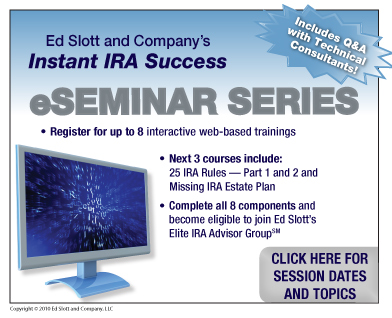
In This Update:
- Q of the Month:
Can I Convert Part of an Active SEP to a Roth IRA?
- Key Focus:
Year-End IRA Deadline Falls on a Saturday
- Ruling to Remember:
Protection for a Minor Beneficiary
Resources
- Ask Us To Speak
- Ed Slott's IRA Advisor Newsletter
- Shopping Cart
- Discussion Forum
- IRA Resources
- IRA and Tax Tables
Professional
Assistance
?? Question of the Month: Can I convert part of an active SEP to a Roth IRA?
Q: I have an active SEP (Simplified Employee Pension) IRA. I’ve been hearing about the positives involved with Roth IRAs and would like to take advantage of the tax-free savings as soon as possible. Can I convert part of it to a Roth IRA right now?
A: As long as the SEP agreement allows you access to the funds (and most SEPs will allow you access), you can do a conversion from the SEP account to a Roth IRA. If you will be receiving future SEP contributions in the account, make sure that you leave enough money in the account to keep it active. Enjoy the benefits of a Roth IRA and make sure you have enough outside money to pay the tax on the conversion.
IN TODAY’S TIMES, BUSINESS MUST BE EARNED
WE TEACH YOU HOW.
REGISTER EARLY AND BRING YOUR OFFICE!
CONTACT US AT 877-337-5688 FOR GROUP DISCOUNT RATES
Disclaimer Plans, Disability Exceptions, Recharacterization Extenstions
|
The October issue of Ed Slott's IRA Advisor Newsletter highlights the IRS rules on the retirement account disclaimer plan. This issue also talks about the disability exception to the 10% penalty, IRS’ extension for 2010 estates and a Roth recharacterization extension for victims of Hurricane Irene. |

|
READ MORE IN OCTOBER’S ISSUE OF ED SLOTT’S IRA ADVISOR NEWSLETTER | |
Inside Ed Slott's IRA Advisor NewsletterIRS Rules on Retirement Account Disclaimer Plan
Tax Court Rules Doctor is Not Disabled Under the Tax Code; Liable for $100K+ in Combined Penalties
IRS Chart: Exceptions to the 10% Penalty IRS Issues Additional Guidance for 2010 Estates and Their Beneficiaries and Extends Several Key Deadlines Disasters Extend Roth Recharacterization Deadline for Some If you are not already an Ed Slott's IRA Advisor Newsletter subscriber, you can preview past issues before subscribing. |
|
|
||
|
|||




 October Key Focus
October Key Focus Ruling to Remember
Ruling to Remember